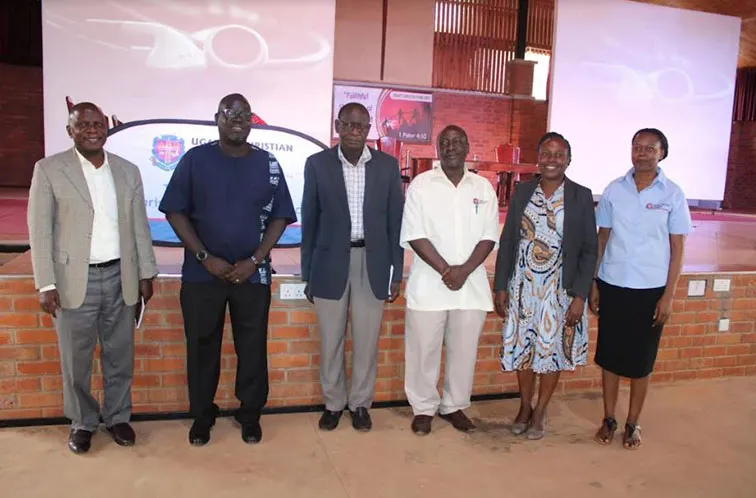By Israel Kisakye
Artificial intelligence has widened the gap between individuals and God on one hand, and narrowed the gap between believers and God on the other.
But to what extent should believers rely on technology in their daily lives as they pursue to understand God more? Is it possible that digital addiction can lead to stunted spiritual growth? These, and more, are some of the questions that Uganda Christian University’s (UCU) Directorate of Research, Partnerships and Innovations (DRPI) has been battling. To seek some answers, DRPI recently held a seminar that centered on the impact of artificial intelligence on Christian faith.
“Today, we are becoming increasingly more dependent on Google than on God,” said Robert Buga D’jalo, a teacher at Kampala International School, during the late July seminar held in UCU’s Nkoyoyo Hall. “We seem to ask Google more than we ask God.”

Buga was one of the speakers at the seminar whose topic of discussion was Artificial Intelligence (AI) and Christian Faith: Contradictions and Convergence. He argued that many of the systems people create are intended to help man live a better life, but that they were instead making him more reliant on them than God.
“When AI takes over the world, we shall have a new world,” Buga noted, before he asked: “We don’t think a lot about evolution because, as Christians, we find our identity in God, but does AI threaten our dependence on God?”
Dr. Angela Napakol, the head of research and partnerships at DRPI, said the emergence of technology has dominated the aspect of decision making, leading to people having more trust in computers than in God, with Buga noting that that is where the danger of artificial intelligence could come from.
“We might reach a point where we rely more on the artificial systems than on God and that is what we don’t want,” Buga reasoned. “As Christians, our existence should be based on the foundation of man, which is the creation of man in God’s image. This means in Christianity, there is a deposit of soul, spirit and who God wants us to be.”
Buga noted that the initial building blocks of artificial intelligence are based on the ability of human beings to build systems that do not challenge ethical issues. He urged Christians to create their artificial intelligence systems so that other people don’t create systems that challenge the belief of Christians in God.
About a decade ago, it was not uncommon to find notices at entrances to churches, urging the congregation to switch off their mobile phones. Now, the wording in the notices has changed. Keep Your Phone in Silence is now the preferred wording. Reason? Many church-goers have abandoned the book Bible in preference for the Bible app on their smartphones. So, a mobile phone is part of the worshiping aid in church.
Similarly, a congregant can use the smart gadgets for recording a preaching or taking photos during worship. Innovations like these will enable God to remain in people’s lives, because, as Buga noted in the July seminar, they will “enable us to solve our everyday problems.”
Holding debates like the one on artificial intelligence and the Christian faith, according to Napakol, will keep people’s faith afloat.
“We can’t just sit back and watch as the world sinks,” she said. “We have to think critically about these issues, and how to get involved, otherwise we risk running behind, instead of ahead.”
The Chaplain of UCU, the Rev. Canon Eng. Paul Wasswa, reminded his audience that man is created in God’s image, and, therefore, it is important for man not to replace God with code. In information technology, a code is a set of programming instructions.
Rebecca Nambuya, a year-one student pursuing a Bachelor of Social Work and Social Administration, said the seminar helped to widen her scope on how to use technology without losing focus on God. “I am now aware of artificial intelligence and how it advances my Christian perspective,” she said.


